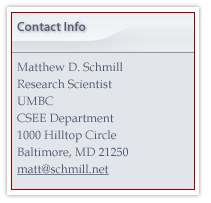|
Text to sketch for tracking problems is a difficult challenge because there are many sources of uncertainty inherent to the problem. Computers are notoriously bad at processing natural (human) language, and struggle with its many ambiguaties: from part of speech tagging, to parsing, to polysemy and reference resolution. A computer is rarely completely certain of the meaning of human language. Similarly, textual descriptions of movements and landmarks are also by nature often spatially ambiguous or vague; humans use vast commonsense and contextual knowledge to know which coffee shop a conversation partner is referring to when she says, "the coffee shop". Automated systems may have a database containing known locations of many coffee shops, yet require a reasoning mechanism for either selecting the correct one or its representing uncertainty about the actual coffee shop being described.
|







